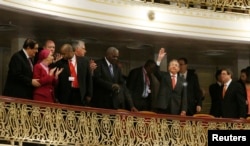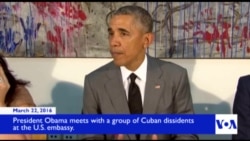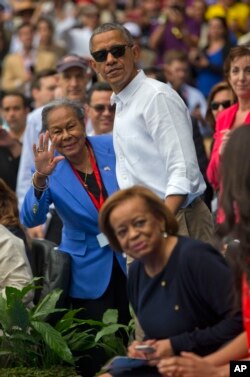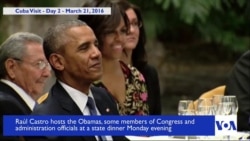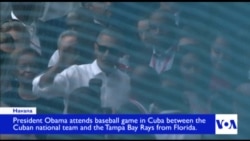Appealing directly to the Cuban people in Havana, President Barack Obama said it is time for the U.S. and Cuba to move beyond their Cold War differences and begin a new journey toward a future that will benefit both nations.
“I have come here to extend a hand of friendship to the Cuban people,” Obama said during a televised address, hours before he departed the island nation Tuesday afternoon. “It is time for us to leave the past behind. It won’t be easy and there will be setbacks and it will take time.”
Speaking Tuesday in the majestic El Gran Teatro de Havana, with Cuban President Raul Castro seated in a balcony directly across from him, Obama expressed hope for future relations between the United States and Cuba and their peoples.
'Understanding, forgiveness'
He added that kind of sweeping change between the former enemies must begin on a human level “with understanding, forgiveness and listening.”
WATCH: U.S. President Obama addresses Cuban people from Havana
Obama said he has hope for Cuba’s future because he believes in the Cuban people, prompting loud applause from the audience. Those attending the speech included Cuban officials and prominent figures, as well as members of Obama’s Cabinet and a bipartisan group of U.S. lawmakers.
The president outlined the two nations’ painful history and separation, what they share in common and the stark differences they must overcome as the United States and Cuba move forward to normalize relations.
Appeal to human rights
Obama cited common values, religion, patriotism, pride, commitment to family, education and innovation. But he added there remain deep chasms between their approach to the economy, society and government.
Speaking directly to Castro, Obama said, “You do not need to fear a threat from the United States,” adding the Cuban government also does not need have to fear the voices of the Cuban people.
"People should be able to criticize their government and choose those who govern them," Obama said.
While the United States has loosened restrictions on travel and commerce since both countries formally restored diplomatic ties in July, more changes are needed, especially on human rights, he said.
“We need the space to change, individuals bring change.” Obama noted, adding in Spanish, “El futuro de Cuba tiene que estar en las manos del pueblo humano,” or Cuba’s future must rest in the hands of its people.
In Washington, U.S. House of Representatives Speaker Paul Ryan condemned Obama's visit to Cuba, telling Reuters news agency the trip legitimizes the "tyrannical dictatorship" of Castro.
Ryan made his remarks to reporters as Obama was wrapping up his historic visit to Havana.
Embargo remains
Castro has blamed a 55-year U.S. embargo on Cuba for many of the communist nations problems and has repeatedly urged Obama to pressure Congress to lift it.
Obama responded during his keynote address on the third and final day of his historic visit.
WATCH: Obama meets with Cuban dissidents at US Embassy in Havana
"As president of the United States, I have called on our Congress to lift the Cuban embargo,” he said to loud applause. “It is an outdated burden on the Cuban people, it’s a burden on the Americans who want to work or do business or invest here in Cuba.”
The Republican-controlled Congress has criticized Obama’s policy change from isolation to engagement with Cuba, saying it has delivered too many concessions.
After the speech, both leaders left the crowded theater to standing ovations.
Obama next traveled to the U.S. Embassy where he met with Cuban dissidents and members of civil society.
Joined by U.S. Secretary of State John Kerry, the president spoke about the importance of hearing “directly” from Cubans about their ideas and concerns as the U.S. shapes its policy toward Cuba.
Among those present was Berta Soler, who was arrested Sunday with her Ladies in White dissident group that holds weekly marches demanding more freedoms.
Also in attendance was Elizardo Sanchez Santa-Cruz, a spokesman for Cuban human rights group, Comision Cubana de Derechos Humanos y Reconciliacion Nacional (CCDHNR).
"It requires, many times, great courage to be active in civil life here in Cuba," Obama said. "This is an area where we continue to have deep differences" with the Cuban government.
Tampa Bay vs. Cuban nationals
Obama attended a baseball game between Major League Baseball's Tampa Bay Rays and the Cuban national team. Leaving after the third inning, he boarded Air Force One, departing for Argentina and capping his visit as the first U.S. president in nearly 90 years to visit Cuba.
Interviewed during the game by ESPN, which broadcast the game, Obama said he thinks Cuba's isolation has empowered those who don't want to see change in communist nation.
WATCH: Highlights of President Obama's trip to Cuba
He said his policy of engaging Havana is not a naive notion, but based on his believe that Americans traveling to the island, and sharing ideas and culture, will promote change.
“What this game is about is goodwill, recognizing that people are people," the president told ESPN.
The Rays won the game 4-1.
Before the game started, Obama introduced Rachel Robinson, the widow of baseball great Jackie Robinson, to the Cuban president. Rachel Robinson and her daughter Sharon Robinson rode on Air Force One to Cuba with the Obamas.
Jackie Robinson played for Cuba in 1947.
WATCH: Obama, Castro attend exhibition baseball game







